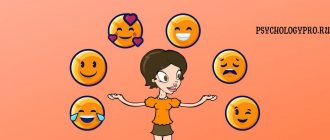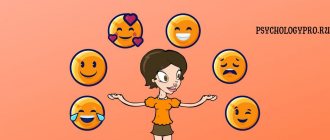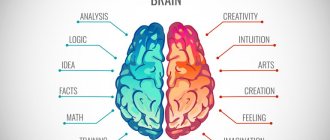In an effort to develop a child’s intelligence, many pay attention only to the child’s cognitive abilities. However, we should not forget about such an important concept as emotional intelligence, that is, the ability to recognize one’s own and other people’s emotions, manage them and understand the reason for their occurrence. In many ways, these abilities are the key to a successful and happy human life. You can start developing emotional intelligence at an early age. We will tell you how to do this in this article.
Why is it important to develop a child's emotional intelligence?
Children react to everything very emotionally. They took away a toy, didn’t buy candy - tears, and vice versa, mom came home early from work or saw a tractor on the street - wild joy. The expression of emotions in preschoolers is not limited to joy and sadness; they can express anger, surprise, shame, annoyance, admiration and other complex emotions. But they are not always conscious. Children with underdeveloped emotional intelligence cannot answer the question of how they feel at the moment. In addition, they experience difficulties in communication due to the fact that they do not pay attention to the feelings of others or misinterpret their emotions. It is with the development of emotional intelligence that the abilities of empathy and compassion are associated.
Children who do not understand their own emotions cannot control them. Therefore, parents of such children often face hysterics and whims.
Psychologists have concluded that the level of development of emotional intelligence directly affects the child’s self-esteem. Those children who have learned to recognize their own and other people’s emotions and understand their cause are usually self-confident, more resistant to stress, and more easily adapt to new conditions. At the same time, children with insufficiently developed emotional intelligence are prone to anxiety - they can perceive any failure as a personal tragedy.
What you should pay attention to
Childhood is a time when kids actively improve all aspects of their intelligence and acquire important social skills. In order to learn how to conduct a dialogue, maintain a conversation, make new acquaintances, and convey their point of view to others, they will need to develop the ability to recognize and analyze both their own and others’ emotions.
However, even this will not be enough for full interaction with society. Therefore, parents need to pay attention to another aspect of the emotional education of children - the ability to empathize. It is the most important social skill for a person, allowing him to achieve mutual understanding even with those people with whom communication did not work out at first.
If a child learns to show sympathy and empathy for others, then it will be easier for him to establish friendly relations with them. Also, such emotions will have a good effect on his own character - they will help him become more sensitive, kind, and attentive to the feelings of other people. All these qualities will become a reliable basis for the formation of a healthy personality.
How to communicate with a child to develop his emotional intelligence?
Emotional intelligence begins to develop in a child from birth. This happens naturally when a mother or another close adult responds to his emotions and gives her care and affection. To see how children learn to understand emotions, watch the video:
Already at an early age, parents can lay a solid foundation for the development of their child’s emotional intelligence. To do this, it is necessary to name the child the feelings he is experiencing. For example, if your baby is crying, do not rush to put a pacifier in his mouth or try to distract him. Try to talk to him and describe his state: “you’re probably upset because I didn’t let you take the cookies” or “I understand you’re angry...”. By describing your child's emotions, you help him get to know himself better. Subsequently, he will learn to control his emotions. When communicating with your child, avoid stereotypical phrases such as “men don’t cry” or “don’t fight - you’re a girl.” These statements not only do not contribute to the development of the child’s emotional intelligence, but also devalue the child’s feelings and make him feel ashamed of himself.
Many of us were taught as children to suppress our emotions. And if vigorously expressing joy is still acceptable, then negative emotions have always been prohibited: being afraid, angry, crying - all this is shameful and ugly. As a result, most of us have been forced to suppress negative emotions in order to appear well-mannered. However, psychologists are confident that holding back strong emotions in childhood can lead to neuroses and psychological problems in adulthood.
In a situation where you, and not the child, are experiencing a strong emotion, you also need to voice it. If your child hits or pushes you in a fit of anger, do not scold him, but calmly explain how you feel. This applies not only to negative, but also to positive emotions. Tell your child often how happy you are to spend time with him, how proud you are of him and how happy you are at his success. Learning to communicate with a baby in this way is not at all easy. At first, a psychologist can help with this, who will teach you not to be afraid to show your emotions and talk about them.
The ability to manage your emotions is the foundation for future success in all areas of life. The ability to respond to any emergency situation soberly and without hysterics distinguishes a person with high intelligence, and we are not just talking about IQ. Emotional intelligence is responsible for the ability to cope with feelings.
EQ or emotional intelligence is the ability to understand your feelings and the feelings of other people, the ability to cope with emotions and direct them in a good direction.
Modern scientific research has shown that a child’s developed EQ helps him solve complex problems and cope with conflict situations. Possessing emotional intelligence, a child easily overcomes difficulties, relying on his strengths.
Emotional intelligence is of great importance not only for the present, but also for the future child.
Professional skills are inextricably linked with EQ: career success largely depends on how much a person can control himself in moments of stress. The life of an emotionally stable person is generally more successful than that of someone who falls into the grip of emotions. Daniel Goleman
American psychologist Daniel Goleman, author of many books on psychology, education, science and leadership, claims that success in life depends 80% on EQ, and only 20% on IQ. And according to research from Talentsmart, a high level of emotional intelligence increases productivity by an average of 58%. This applies to all professions - people with high emotional intelligence earn more and feel happier and more harmonious in all areas of life.
That is why modern parents pay attention not only to the development of their child’s IQ, but also to their emotional intelligence. An excellent help for his upbringing in a child will be the book of the “Choice of Millions” series - “Little Big Heart”.
| "Little Big Heart" |
Here is a book by French writer Jocelyne Vitek and illustrator Christine Rousset, translated into 15 languages and sold more than a million copies. This book helps kids all over the world understand their emotions and understand complex feelings such as anger, fear, resentment, sympathy, love, sadness and joy.
Little big heart
1 112 ₽
The heart shines like the sun - from happiness, flies on wings - from bold ideas, aches and hurts - from quarrels and jealousy. What do fear and anger look like? This charmingly light book will help children, with the help of simple and beautiful images, understand their complex inner world of feelings, and adults will talk with children about their experiences - bad and good - without encroaching on their mysterious and magical garden called Emotions.
Look
This is the story of a little girl's big heart. Why does resentment hurt the heart and how to fix it? Why does fear make the heart beat faster, and happiness make it freeze? Under this cover lies a guide to the children's world of adult emotions. With the help of beautiful images, the book will help children better understand the complex inner world of their feelings and answer questions that concern children.
Why this book? How did it happen that children and parents loved her so much? We talked with Ulyana Bednarskaya, chief editor of the “Baby 0+” editorial office, about the book “Little Big Heart” and found out what makes it special.
This is one of the most unusual books from our editors! Firstly, emotional intelligence is now a very relevant and popular topic - the ability to understand and explain one’s emotions, the ability to express them through images. The series is important for the new generation of “alpha” children (born after 2010) - gifted, bright, creative, dependent on technology, but at the same time hypersensitive and vulnerable.
Secondly, delightful poems for the books were written by the recognized master of poetic translations Elena Vadimovna Baevskaya, whom we met on this project. Working with such professionals is a pleasure and happiness.
And I would especially like to note the unusual form of the publication - the cutting begins from the cover and ends on the last page. It will definitely attract children. You immediately want to pick up this book and plunge into the magical world created by two talented French women - author Jocelyn Vitek and illustrator Christine Rousset. No wonder the books in the series are known all over the world: translated into 15 languages and sold in more than a million copies!
| Words and emotions |
This book is written in verse. Why poetry? Child psychologists and early childhood development specialists have found that melodic, rhythmic poems are better perceived by the child, increase his attention and arouse interest. Prose quickly tires children with its monotony, which is why many children's writers write their fairy tales in verse.
The poetic translation of the “Choice of Millions” series belongs to Elena Vadimovna Baevskaya, winner of prestigious literary awards, master of translation from French and other European languages. We asked Elena Vadimovna several questions about the connection between words and emotions and the influence of fiction on the development of emotional intelligence.
Labyrinth
What are the significant differences between translations for adults and for children?
Elena Baevskaya
In my opinion, there are no significant differences at all. To translate a book, you need to play a game as if you were writing the book yourself. You transform and translate. Sometimes you want to, together with a classic of French literature, understand the subtle movements of the human soul, sometimes you want to swing on a swing and sit in a tree with cute animals and birds.
L
What was the most difficult thing when working with these texts?
What is the most interesting? EB
It is generally difficult to translate! I haven’t come across any easy translations; any simplicity is deceptive. Everything was interesting: putting the text in lines that matched the layout and pictures, coming up with rhymes so as not to disturb the naturalness and simplicity of the poems...
L
How can reading poetry and literature help develop emotional intelligence?
EB
A strong intellect implies a rich emotional life. And books from a very early age teach us to admire, rejoice, empathize, and fantasize. They give the child something that experience has not yet told him, and then this will help him love, make friends, and generate scientific hypotheses. Children's classics help greatly in the development of emotional intelligence: Chukovsky, Marshak, Barto, Berestov. And there is a lot of beauty in modern literature for children. It is impossible to make a mistake here: if the book is poorly written, the child will not read it and will get bored.
| How to train emotional intelligence? |
Emotional intelligence is a skill that can be trained. Are books the only thing that can help develop a child’s EQ? We asked this question to candidate of pedagogical sciences Elena Yurievna Azbukina, a practical psychologist, certified gestalt therapist, specialist in educational kinesiology, specialist in working with childhood trauma and families.
There are games and exercises aimed at understanding one’s emotions, as well as understanding the emotional reactions of other children and the ability to adequately express one’s emotions. I will give examples. “I rejoice when...” The presenter calls the child by name and throws him a ball, asking the question “When do you rejoice?” The child catches the ball and says: “I am happy when...”. This game can be diversified by inviting the child to tell him when he is upset, surprised, or afraid. Such games can tell you about the child’s inner world, about his relationships with adults or peers. The game will help the child understand himself better.
"Music and Emotions". After listening to a musical excerpt, the child describes the mood of the music: happy/sad, happy/angry, brave/cowardly, festive/everyday, sincere/aloof, kind/tired, warm/cold, clear/gloomy. This exercise promotes the development of imaginative thinking and the ability to convey an emotional state.
So, emotions play an important role in the lives of children, helping them to perceive reality sensibly. Not only his psychological comfort, but also his ability to get along with people and find the right solutions depends on whether a child learns to understand himself and others, adequately respond to situations and cope with emotions.
“Little Big Heart” is the door to the world of emotions of a little person. She will teach you to overcome fear and believe in yourself, cope with sadness and express joy, overcome self-doubt and make plans for the future, relying on your strengths.
Games to develop emotional intelligence
- Acting out scenes from life. Example of a game: take a toy hare and pretend that the bunny is crying. Try with your child to use facial expressions to show how the bunny cries. Discuss why he is crying (he is sad, he is offended, he is cold, his paw hurts, etc.). Figure out how you can help him. Such games can be started as early as two years of age. But please note that the situations played out should be close and understandable to the child. Demonstrating emotions and explaining them using simple examples will help your child learn to understand the feelings of other people.
- Art therapy. Listening to fairy tales, the child gets acquainted with various options for expressing emotions and learns to empathize with the characters. You can also develop your child’s emotional intelligence through drawing (especially with paints) and music therapy.
- "Guess the emotion." This game is suitable for children of older preschool age. Using facial expressions, depict some emotion and ask the baby to guess what you are showing. Then the child himself can act as a leader and show emotions to you.
- “Hands get to know each other, hands quarrel, hands make peace . This exercise is done in pairs. Sit opposite each other and close your eyes. The point of the game is to express emotions (for example, anger, joy, sadness) using your hands.
- "What the Mood Is Like" . Invite your child to imagine and think about what the mood is like. It is better for an adult to start the game (for example, my mood is like a babbling brook" or "my mood is like a hurricane").
- "Gather the emotion" . This educational game can be found in the store or made with your own hands. Draw faces depicting different emotions and cut them into parts (eyes, mouth, eyebrows). Then mix them and ask the child to “collect” the given emotion.
- Games with emotion cards . Using special cards depicting emotions, discuss with your child what the characters in the pictures are experiencing and what causes their emotions.
Games for developing emotional intelligence should be selected not so much based on age recommendations, but rather on the child’s experience and interests. Each child has his own individual development path, and when the baby is ready, he will definitely touch on such an important topic of emotions.
How to develop emotional intelligence in children?
- Discuss books and films: determine the feelings of the characters, the connections between their feelings
- and actions.
- Discuss the child’s empathy for the heroes of the works. Express your attitude towards the characters.
- Practice teamwork built on cooperation, where each participant is motivated. Build an environment in which you want to learn and improve some skills.
- Organize mutual help in the classroom if possible.
- Set the mood of the lesson (through a funny joke, an entertaining story from the life of a scientist, a smart anecdote, comments on the weather or your mood...).
- Take moments of mindfulness. Together with the children, right in the lesson, you can be silent, breathe, calm down: clear your head of thoughts, look out the window.
- Give vivid examples-stories (even fictional ones) of how someone coped with a situation.
- Name your child’s feelings: “I see that you are angry, are you very upset?”
- Name your feelings: “I’m worried that you won’t cope, I’m worried how
- the lesson will pass." This brings contact with children to another level of openness.
conclusions
Experts agree that a high level of development of emotional intelligence is the key to success in life. In preschool age, the development of the emotional sphere acquires special significance, since during this period the child actively develops his self-awareness and self-esteem. Parents have many opportunities to help develop their child's emotional intelligence. Discuss emotions and the reasons for their occurrence with your child, openly express your feelings and do not forbid your child to do so. There are also many special games for developing emotional intelligence.
Parental responsibility for children's emotional development
Adults make a big mistake when they make fun of the antisocial actions of preschoolers. It happens that a child will say ambiguity or outright vulgarity (which he, of course, does not understand), and this causes unbridled joy in young parents. The preschooler automatically attributes his prank to positive actions that please others, and, of course, will repeat it. In such conditions, emotional intelligence takes a dangerous turn in its development, and with a high degree of probability this disorder will result in real problems in adolescence.
The idea of socially correct behavior will be formed in a preschooler only if he masters an adequate emotional attitude to moral situations. The child must clearly understand that pulling a cat by the tail is not funny, but outrageous; teasing a peer is not fun, but mean and shameful.
If parents expressively, in an emotional sense, convey their attitude towards the negative antics of a preschooler, he correctly evaluates his action. A feeling of guilt appears, and in the future the child stops the behavior that causes censure.
Children receive the most clear example of what emotions are appropriate in certain situations and how to cope with negative feelings from their parents. And then they use the same methods of showing feelings. The development of emotional intelligence in children is impossible without the social responsibility of adults.
Emotional intelligence makes us closer to other people
It is important for a child to learn to understand and be attentive not only to his own emotions, but also to the experiences of others. By “living” his emotions, comparing them with the experiences of other people, discussing this with adults, the baby learns to identify and respect other people’s. Thanks to this, at an older age, the ability to empathy develops - the ability to consciously empathize and sympathize.
Empathy allows you to successfully interact with loved ones at home, with children in groups and at school. And then - build harmonious relationships at work and in your own family, maintain relationships with loved ones and friends, and come to agreements.











